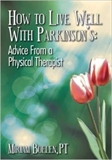Book Review: How to Live Well With Parkinson's Disease
Author: Miriam P. Boelen, PT
amazon.com (2013)
Reviewed by Clynton Correa, PT, MSc, PhD
Universidade Federal do Rio de Janeiro
Brazil
May 2014
This self-published book, "How to Live Well with Parkinson's Disease: Advice from a Physical Therapist," written by Miriam P. Boelen, a specialized physical therapist, is a helpful resource providing information and practical suggestions beginning from the diagnosis of Parkinson’s disease (PD). It consists of eight chapters exploring relevant topics concerning the motor strategies for PD patients.
The author addresses the book to people with PD and caregivers in a style and text that is easy for them to comprehend. In any case, this book is also indicated for all health professionals who are not specialized in PD and for health care students who don’t know about Parkinson’s disease. Often, the reader will imagine the writer talking to them personally because of the writing style.
In general, this is a patient-centered book emphasizing physical therapy approaches in different contexts related to motor impairments faced by patients, caregivers and family members. The motor impairments are presented in a didactical manner to teach the patients to overcome difficulties in daily activities through pictures and tables. At the end of each chapter, readers will find a box with key points summarizing the topics approached in the chapters.
In the first chapter the writer “talks” with the person diagnosed with Parkinson’s about the process of finding a doctor and therapists for treatment and guidance over time. In addition, this “conversation” offers stimulus for patients to be proactive and protagonist during all processes in this new health condition.
In the second chapter the reader will “hear” about exercises, such as: the effects of exercise on PD based on scientific evidence, components, types and guidelines for exercise.
The subsequent chapters address motor impairments usually experienced by patients in different environments to perform daily activities, such as: rolling and getting out of bed, sitting and getting out of a chair and walking problems. Readers will also find one chapter about tips for choosing walkers and rollators and another about maintaining balance. There is a specific chapter dedicated to caregivers offering tips with reference to physical support of PD patients.
At the end of the book, the readers will find an appendix describing various devices to help the patients in different situations or conditions, such as posture, tremor, sitting in a chair, comfortable shoes. The readers will also find a glossary to learn the technical terms commonly used by health professionals who are specialized who are specialized in PD. Finally, readers that want to know more about topics approached in the book will find the related references.







